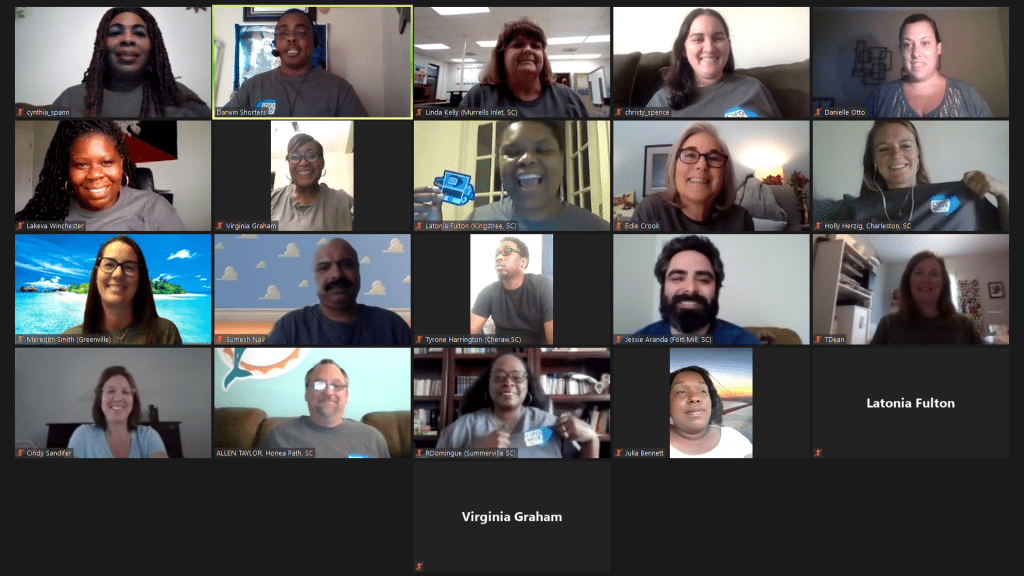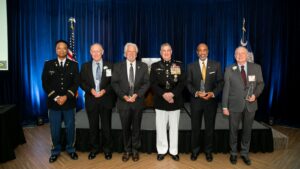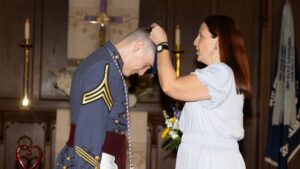
Photo: South Carolina educators participating in a small session during Computer Science Professional Development Week
College’s STEM Center of Excellence prepares K-12 teachers for enhanced instruction
When school resumes, hundreds of K-12 teachers in South Carolina will be better prepared to educate their students, whether it be face-to-face, virtually or a combination of the two.
Those teachers will integrate new techniques and concepts into their lessons, learned over the summer from The Citadel’s STEM Center of Excellence (SCE).
In addition to supporting Citadel cadets and students, the SCE serves as a community resource, holding numerous educational events for children annually and providing robust professional development programs for K-12 STEM teachers.
In July, more than 400 teachers participated in two, week-long workshops presented by the SCE. Both were originally planned to be held on campus, but were moved to a virtual format in response to the pandemic.
The goal of both workshops: help teachers inspire and prepare more South Carolina students to pursue STEM-related careers.
Addressing the shortage of computer science teachers
The first workshop involved the SCE’s ongoing work to increase the number of computer science teachers in South Carolina schools.
The SCE offered computer science professional development for nearly 250 teachers, with the goal of ensuring that every high school, and most middle schools, have at least one dedicated computer science teacher.
The South Carolina Department of Education selected the SCE to provide instruction in response to new, stricter guidelines about computer science requirements in South Carolina public high schools.

“Now that a keyboarding class no longer counts as computer science credit, 436 high schools have to be able to teach in-depth computer science,” said Jennifer Albert, Ph.D., director of the The Citadel STEM Center of Excellence. “We’ve been working the last two summers with the Department of Education to make sure all of those teachers have the training and the certification needed to teach those classes.”
The experience was free for teachers, thanks to the funding from the state’s Department of Education, as well as a grant from the CS Teachers’ Association.
Infusing computing
The second workshop, held the last week of July, represented the final stage of a multi-million-dollar National Science Foundation grant awarded to the SCE, and project collaborators at North Carolina State University. The goal of the STEM+Computing project was aimed at helping teachers integrate computing and STEM curricula into their classes.
Nearly 200 teachers participated in the event, learning how to blend computational thinking — a problem-solving method that describes problems and their solutions in ways that a computer would understand — into their educational content.
Providing the workshop virtually didn’t faze the SCE director.
“We’ve had to restructure everything get the same, small-group, personal feel,” said Albert. “We had to almost triple the number of session facilitators that we hired this year, because we want them in small groups so they have the same amount of attention that they would have face-to-face.”
In fact, the SCE’s methods for adjusting to a virtual format, as well as more information on the workshop, is included on page 59 of a recent publication in the Journal of Technology and Teacher Education.
The SCE is a collaborative effort between The Citadel’s Zucker Family School of Education, the School of Engineering, and the Swain Family School of Science and Mathematics. It delivers outreach initiatives, like Storm The Citadel and more, to increase student interest, participation, and opportunities in the STEM disciplines.

 Introducing The Citadel Class of 2025
Introducing The Citadel Class of 2025 Academy of Engineers inducts four new honorees during The Citadel’s School of Engineering event
Academy of Engineers inducts four new honorees during The Citadel’s School of Engineering event Future nurses graduate during pinning ceremony at The Citadel
Future nurses graduate during pinning ceremony at The Citadel

